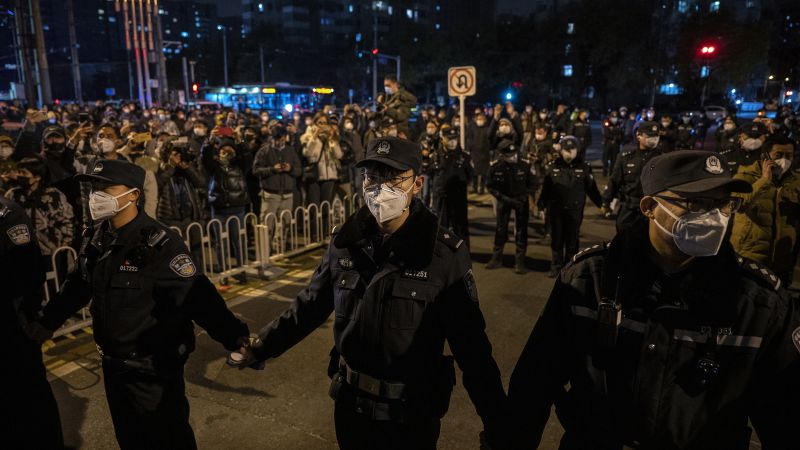Chinese police are using cellphone data to track down protesters | CNN
CNN
—
Chinese authorities are using cellphone data to track down protesters who demonstrated against the government’s stringent Covid restrictions in Beijing, according to a recording of a phone call between a protester and police heard by CNN.
Hundreds of demonstrators gathered along Beijing’s Liangma River on Sunday night, calling for an end to the incessant Covid tests and lockdowns. Some also decried censorship and called for greater political freedoms.
The extraordinary show of dissent in the heart of the Chinese capital ended largely peacefully in the early hours of Monday. But some protesters have since received phone calls from the police inquiring about their participation.
A protester told CNN they received a phone call Wednesday from a police officer, who revealed they were tracked because their cellphone signal was recorded in the vicinity of the protest site.
CNN is not naming any of the protesters in this story to protect them from reprisals.
According to a recording of the phone conversation listened to by CNN, the protester was asked if they went to the Liangma River on Sunday night. When they denied being there, the caller asked: “Then why did your cellphone number show up there?”
In China, all mobile phone users are required by law to register their real name and national identification number with telecom providers.
The protester was also told to report to a police station for questioning and to sign a written record. When they asked why they had to comply, the caller said it was “an order from the Beijing Municipal Public Security Bureau,” according to the recording.
CNN has reached out to the Beijing Municipal Public Security Bureau for comment.
Some demonstrators took precautions against being tracked or identified. One protester told CNN she kept her phone on airplane mode during the demonstration, and she had not been contacted by the police as of Thursday afternoon.
While protests over local grievances do occur in China, the current wave of demonstrations is unprecedented since the Tiananmen Square pro-democracy movement of 1989. Since Chinese leader Xi Jinping came to power in 2012, the Communist Party has tightened its grip on all aspects of life, launched a sweeping crackdown on dissent, and built a high-tech surveillance state.
China’s security apparatus has moved swiftly this week to smother mass protests that swept the country, keeping a heavy police presence in locations where crowds had gathered over the weekend, or planned to do so.
In Shanghai, where some of the boldest protests took place with crowds calling for Xi’s removal on two consecutive nights, police searched residents’ cellphones in the streets and in the subway for virtual private networks (VPNs) that can be used to circumvent China’s internet firewall, or apps such as Twitter and Telegram, which though banned in the country have been used by protesters.
Police also confiscated the cellphones of protesters under arrest, according to two protesters who spoke to CNN.
A protester who was arrested over the weekend said they were told to hand over their phone and password to the police as “evidence.”
They said they feared police would export the data on their phone after it was confiscated by officers, who told them they could pick it up a week later.
Another protester said police returned their phone upon their release, but officers had deleted the photo album and removed the WeChat social media app.




